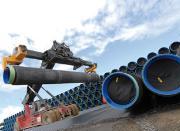The Stralsund Mining Authority had previously approved the construction and operation in German territorial waters (within 12 nautical miles) and the landfall area on 31 January 2018.
“We are pleased that all necessary permits are now in place for the German route section, which has an overall length of 85 kilometres,” said Jens Lange, Permitting Manager Germany at Nord Stream 2 AG.
These permits are the result of the extensive process carried out in accordance with national law since April 2017. The permitting process has shown that the Nord Stream 2 Pipeline:
- is needed in order to cover part of Europe’s future supply gap;
- will contribute to increasing security of supply and competition in the EU gas market;
- is the most efficient way, both economically and ecologically, to transport gas from the world’s largest reserves to European consumers;
- can be built in an environmentally friendly way, with impacts being only local and temporary;
- can help achieve climate goals, as gas-fired power generation only emits half as much CO2 as coal-fired power generation.
The national permitting procedures in the other four countries along the route – Russia, Finland, Sweden and Denmark – are proceeding as planned. Further permits are expected to be issued in the coming months. Accordingly, scheduled construction works are to be implemented in 2018 as planned.


